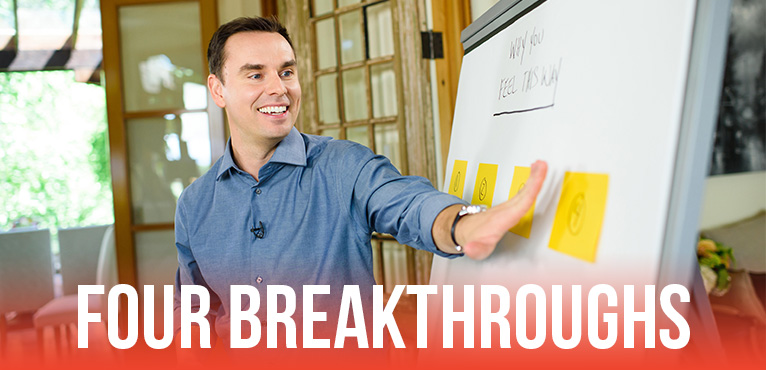SUMMARY
- “The most advanced communication strategy in the world is to elicit emotion more, to ask others about their feelings.”
- Are you a good communicator? Learn what great communicators do to make a lasting impact on others and how you can apply these tips to your own conversations!
- “Great listeners aren’t just reflecting things back to somebody. Great listeners are also helping others share more.”
- In this episode, learn how to improve your listening skills and why going into emotion is the key to building strong relationships with others!
- Watch the video to get the full training.
- Already have the High Performance Planner and CRUSHING each and every day? Let’s celebrate you! Take a photo with your planner and use #HPXlife or #TeamHPX.
HOT NEWS & DEALS!
-
Join the Entrepreneur’s Challenge!
Sign up for my 7-day crash course and you’ll learn the strategies, tools, and revenue drivers needed to start (or scale) your dream business! Click here to sign up!
-
Get the High Performance System!
If you want to level up personally and professionally, High Performance System is the resource you need. The High Performance System will guide you through developing and implementing the 6 science-backed habits that will move the needle from ordinary to extraordinary. Develop the habits that lead to long-term success, positive relationships, and healthy well-being! Get the High Performance System!
DID YOU KNOW?
I give weekly prizes, gratitude and shout-outs to our students, so post a screenshot or video on Instagram and use #TheBrendonShow! I can’t wait to hear your thoughts about this episode!
RELATED POSTS
My Secret to How I Win Each Day
The Greatest Secret of Successful Couples
How to Become a More Positive Person
How to Let Go of Judgement
How to Master Motivation
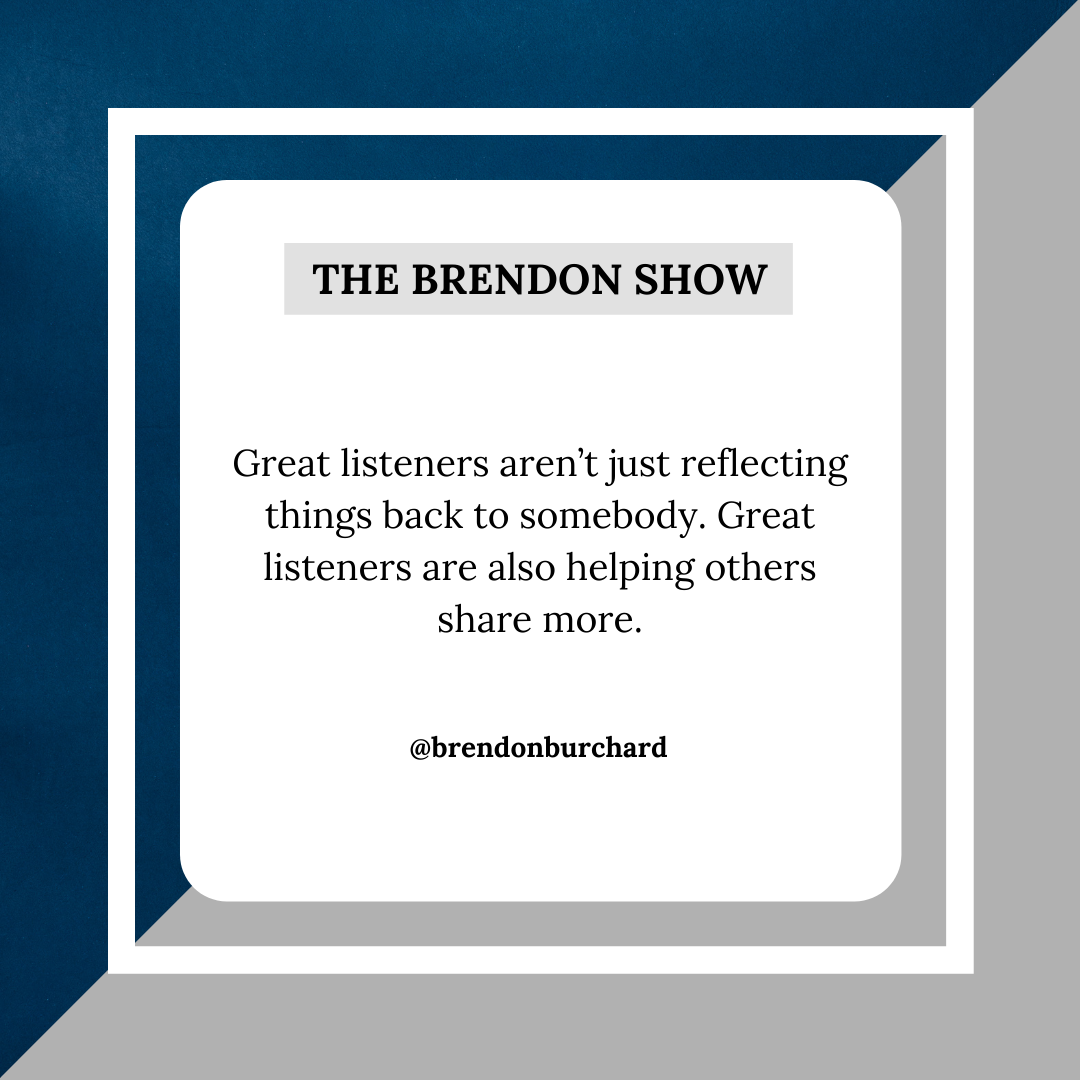
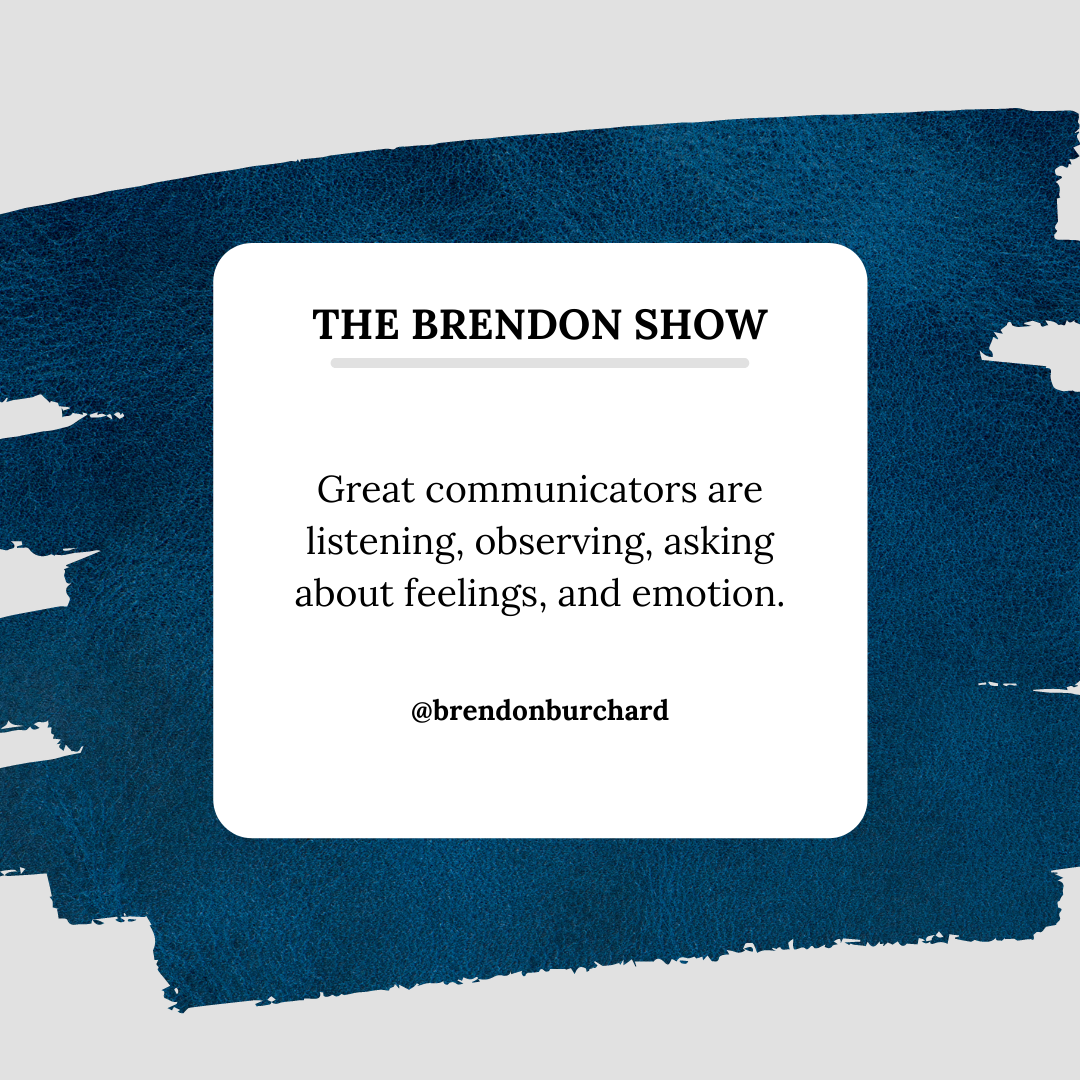
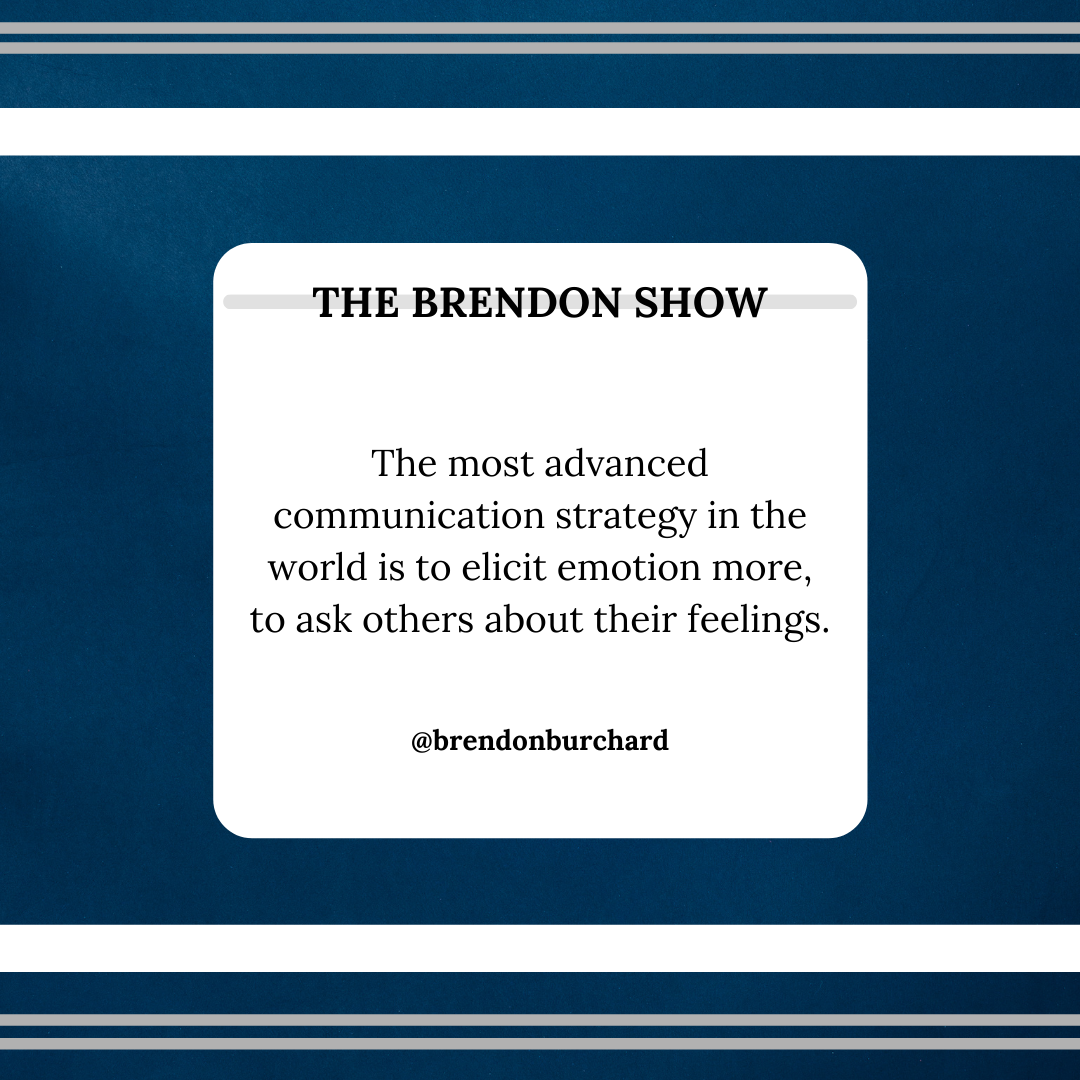
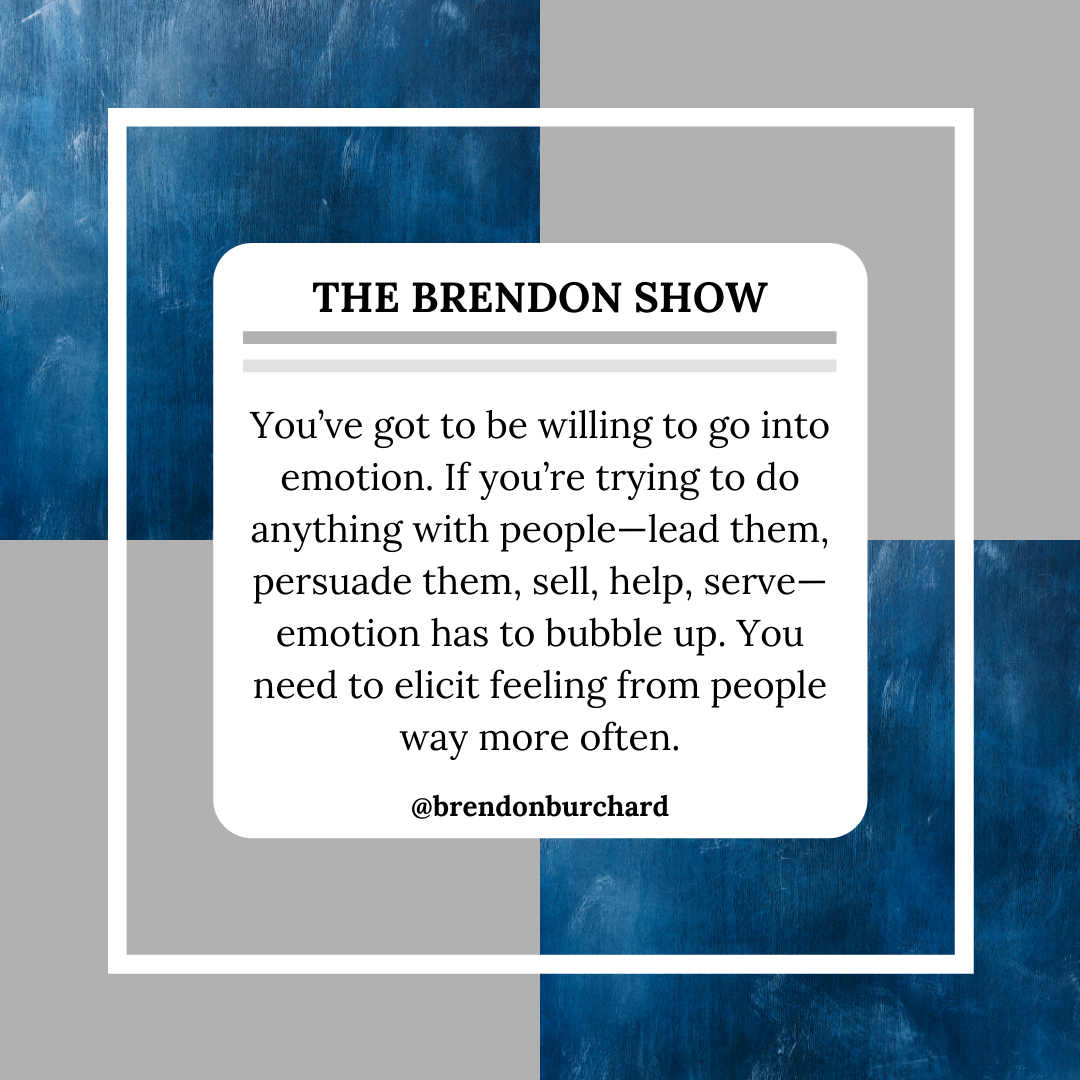
FULL TRANSCRIPT
[The following is the full transcript of this episode of The Brendon Show. Please note that this episode, like all TBS episodes, features Brendon speaking extemporaneously–he is unscripted and unedited. Filmed in one take, The Brendon Show has become one of the most viewed unscripted, direct-to-camera self-help series in the history of YouTube. It has also been the #1 Podcast in all of iTunes and is regularly in the top podcasts in Self-Help and Health categories around the globe. Subscribe to the free motivational podcast on iTunes or Stitcher.)
So what makes you a great communicator? If you and I have lunch and I walk away, I’m like, “Wow! She was a great communicator.” Why am I going to say that? Usually because you help elicit my feelings, you help elicit my goals, and you help elicit my process. How’s it going?
Great listeners aren’t just reflecting things back to somebody. Great listeners are also helping others share more.
And what do people love to share? They love to share things about their life, their passions, their interests. Okay, you can reflect those things back to people, but if you go one level deeper and you’re the person who helps people share their feelings around you, I mean, isn’t that funny?
The most advanced communication strategy in the world is to elicit emotion more, to ask about their feelings.
So when they described their day, instead of you saying, “Oh, then what did you do next?” That’s like procedural and say, it’s like, “Oh, how did you feel about that?” Some of you guys know I was lucky to work with and know and do business with one of the persons considered one of the great interviewers in history. Both two different types of people, with Larry King, he’s a great friend and a mentor and I’ve done work with him and Oprah Winfrey, great friend and mentor and done work with her. Both of them are master listeners. Something I learned from Larry that I’ll never forget is I was asking him what makes a great interviewer and he gave me this example of the question, one of the first questions he asked Mark Zuckerberg who is the CEO of Facebook. So think about this. You have the opportunity to interview Mark Zuckerberg, the CEO of Facebook, at a time especially when they interviewed, it was pretty much the biggest conversation in the tech world. So you get to sit down with somebody who’s building the biggest platform literally in the history of the planet, they’re running it. What are you going to ask them?
Here’s what Larry told me he asked Mark Zuckerberg, CEO of Facebook. His first question or sorry, his favorite question to him was, “So Mark, what’s it feel like to be the CEO of Facebook? What’s it like to be the CEO of Facebook?” He went right to try and to get to like, what does that feel like? That’s a big company. You know, you reached 2 billion people now, what’s that feel like?
So great communicators are listening, observing, asking about feelings, and emotion.
Oprah is magic on her set as she was able, through her vulnerability and her openness for 25 years on television at the top, to be able to have people feel so comfortable with her presence that they would openly share their feelings where it wouldn’t happen on other shows. You watch Oprah Winfrey and then you watch like a news television broadcast. It’s completely different. The engagement she had with other people ’cause she was willing to go into emotion.
You’ve got to be willing to go into emotion. If you’re trying to do anything with people, lead them, persuade them, sell, help, serve, emotion has to bubble up. You need to elicit feeling from people way more often, way more often.
It’s not just, “Hey honey, how did school go today?” “Well, I went to this class. I had this for lunch. This kid was nice, this kid wasn’t.” It’s like, “How did you feel about that? How did you feel about that? What were you feeling when that was happening?” These types of questions are so basic and people forget to ask them, but that’s what’s really advanced because that’s what elicits more, what’s advancing communication strategies. What elicits more, what elicits more. But not just more information, more feeling.
So I said you’re listening for three things: feelings, goals. This is so important. Great coaches, as example, always say, “Oh,” so once they get the feeling, “Oh, what did you want to feel? What did you want from that? What are you hoping is going to happen? If everything was great, what’s next month look like? What are you trying to do by the end of this month, the end of this year,” right?
Just getting people to speak about their goals, their desires, their ambition, their hopes, their dreams, great communicators do that with people.
Really great communicators do that. I’ve been blessed to work with two different presidents, two different US presidents, one Democratic, one Republican. So don’t you freak out. And what I noticed in both of them, their ability to have a conversation with people and ask them about their family and what they want for their family. Think about that. The greatest politicians in the world are talking about, “This is what you probably want for your family.” Or asking, “What would you like for your family? What do you hope for in your career? What would you like this nation to be like? What would you like this country to be like?” That question of, “What are our goals here? What are we trying to do here? What do you want? What are you after?” Those are the questions of great communicators.
So I said feelings, goals, and this last place which is so important: process. “Tell me how you did that. What were you thinking through when you were doing that? What did you want when you were doing that? How did that turn out? If you could do it again, what would you do differently?”
These are process questions, right? Questions about not just how’s it going, but how are they feeling, thinking, and experiencing how it is going? Think about this pandemic right now, right? All you have to do is go, “Pandemic. How’s that going for you?” Right? And immediately people start talking to you. Boy, if you’ve ever wanted to communicate with people, this is the year of talking through how they’ve managed a pandemic, economic maylay, political disconnect. It’s so easy to engage people in conversation this year, right? ‘Cause what do most people usually talk about? “How was your commute this morning? How was the weather?”
But now we have bigger things to talk about, larger concerns. And because of that, it’s easier to get conversation going, but a lot of people forget about process. Did you talk with your family about how these last 30 days went for them? How they felt, what they wanted, what they want next month, how they want it to go now. Literally during this conversation on a walk this morning with my wife, before I even talked about what I was talking about here today, we’re just talking about,”Oh, okay, well, we survived October, right? Okay, got through that is culturally, economically in the world with the businesses. It’s like, “Great, but what do we want now?” Like, we’re always kind of recalibrating, how do we want our day to go? We talked about morning routines or we talked about what we want to learn. And just in a conversation about, what do we want it to be like now? Great communicators and great relationships and couples are always talking about that.
How do we want to live?
What do you want from this life?
What do you want from this life?
What do we want together?
How should we do this journey together?
That’s process. Communicators are doing that all the time. “Which should this feel like, what should this be about? How do we want it to go?” That’s process. All right, I hope you guys liked this one.


